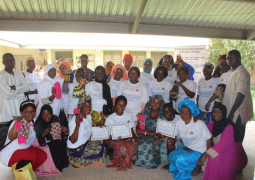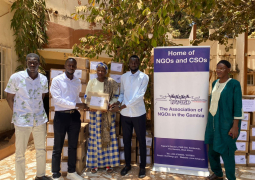The move comes as the country continues to grapple with an array of internal challenges within the realm of politics due to political tensions including inter and intra-party conflicts, as well as inter-ethnic intolerance and polarisation.
With the issue at hand, it appears that politicians, opinion leaders and other interest groups are doing little to curb the situation, amid continuous use of rhetoric and ethnic sentiments that deepen divisiveness and tensions in the country on social media.
Ms. Salama Njie recalled that over the past years, the country’s political system has been greatly characterised by heightened political tensions and bickering, which she observed, has left the country divided.
This, she said, is the main causes of these tensions and conflicts which are multifaceted in nature.
She noted that this could be linked to weak political structures, politicised state institutions, and the absence of dialogue spaces and infrastructure for cultivating dialogue and national reconciliation.
“Politically motivated violence has been a recurring feature of elections in The Gambia. Politicians, opinion leaders and other interest groups on social media continue to use rhetoric and ethnic sentiments that deepen divisiveness and tensions in the country,” she said.
In view of this situation, she noted that key state and non-state actors need to adopt best approach to address political-related conflicts, especially electoral disputes and violence.
“Another justification for this intervention is premised on the existing capacity gaps in political party structures to address election-relation disputes to minimise Intra and Inter-party-related violence. There is over-reliance on litigation to resolve those disputes within and between political parties. This suggests limited options of resolution mechanisms to address election-related conflicts. There is a need to strengthen mediation mechanisms in political party structures to resolve disputes. In this regard, ensuring that ADR is used effectively in election-related disputes is crucial.” she said.
Also speaking, Amul Nyassi, co-chairperson of the Inter-Party Committee, believed the engagement comes at a time when the Gambia is preparing to conduct another election which is the Local Government Elections in 2023.
He stated that disputes are part of election because living beings can have conflicting interests, adding that in some societies, some people and communities prefer resolving disagreements outside police stations and or courthouses using the already available embedded traditional value systems.
“In such instances, there will always be an authority that will command the respect of all and whose judgments would generally be accepted by the entities in dispute.”
The inter-party Committee, he added, is formed to be an instrument of alternative dispute resolution.
“In order to enhance its performance, the IPC has undergone training on the nature of mediation and who can be an effective mediator to resolve disputes depending on the nature and scope of such disputes. As political parties, the inter-party committees are fully conscious of the sensitive nature of politicking and know this field is highly prone to emotionally charged disputes.” he said.
Nyassi said a well-trained politician on alternative dispute resolution will have an enhanced capacity to build and maintain peace for an expansion of democratic space that will augur well for reconciliation of political differences in a less acrimonious manner.
Read Other Articles In National News



